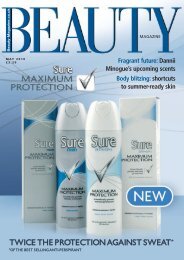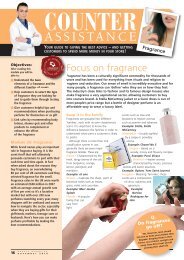Sara Cox talks Radox, relaxation and rude ... - Beauty Magazine
Sara Cox talks Radox, relaxation and rude ... - Beauty Magazine
Sara Cox talks Radox, relaxation and rude ... - Beauty Magazine
Create successful ePaper yourself
Turn your PDF publications into a flip-book with our unique Google optimized e-Paper software.
E X C L U S I V E C T P A C O L U M N<br />
By Association<br />
Are chemicals in cosmetics a cause for concern? Dr Chris Flower,<br />
director-general of the CTPA, provides some facts about the<br />
safety of the chemicals in everyday products<br />
Arecent story in the media<br />
reported that the average<br />
woman puts over 500<br />
chemicals on her face each<br />
day; what it failed to mention was that at<br />
the end of the day, the average woman<br />
washes them off again. However, I<br />
recognise some people may feel<br />
concerned about these numbers, so would<br />
like to provide some additional, <strong>and</strong><br />
hopefully reassuring, facts about chemicals<br />
that did not make the headlines.<br />
SAFETY, NOT NUMBERS<br />
The number of chemicals mentioned in<br />
the story was said to be over 500. I have<br />
no idea whether this is true or not – in all<br />
likelihood, neither have the researchers. A<br />
number of cosmetic products were simply<br />
chosen, the number of ingredients in each<br />
counted <strong>and</strong> then multiplied by the<br />
number of different products a selection<br />
of women said they used. This might be<br />
considered extrapolation by some;<br />
guesswork by others.<br />
Regardless, the exact numbers of<br />
chemicals we are exposed to is not<br />
important. In fact, everything is a<br />
‘chemical’, whether natural or man-made.<br />
(To find out more about this, visit the<br />
CTPA website www.thefactsabout.co.uk<br />
where a new section entitled The Facts<br />
About Chemicals contains comments<br />
from, amongst others, the Royal Society of<br />
Chemistry). The important issue is whether<br />
these chemicals are doing harm or not.<br />
Going back to numbers though, in<br />
actual fact, we consume thous<strong>and</strong>s of<br />
chemicals in a day. Most of these come<br />
through our food <strong>and</strong> drink as well as the<br />
air we breathe. They get into our bodies<br />
because the stomach <strong>and</strong> gut are<br />
specifically designed to aid the absorption<br />
of foods, while our lungs aid absorption<br />
from the air.<br />
A simple cup of coffee contains at least<br />
200 different chemicals <strong>and</strong> these will vary<br />
depending on the source of the beans <strong>and</strong><br />
the way the coffee itself was made – <strong>and</strong><br />
that is before you add milk <strong>and</strong> sugar, or<br />
lemon in my case. Even a lemon contains<br />
hundreds if not thous<strong>and</strong>s of chemicals, as<br />
do all the fruits <strong>and</strong> vegetables we eat<br />
without a second thought.<br />
TOXIC CLAIMS<br />
One of the concerns expressed in the<br />
media story was that chemicals from<br />
cosmetics might be absorbed into our<br />
bodies <strong>and</strong> build up over time to produce<br />
dire consequences. This is simply a popular<br />
myth. Our skin is a very efficient barrier<br />
<strong>and</strong> very little can get in through it. For<br />
example, water is one of the smallest of<br />
chemicals, yet skin is an effective barrier to<br />
it. If you are thirsty before taking a bath,<br />
you will still be thirsty afterwards. If skin<br />
was as permeable as some imply, simply<br />
being in contact with all that water should<br />
allow sufficient in to quench your thirst.<br />
But of course that cannot happen.<br />
However, the skin is not a perfect<br />
barrier. Some chemicals are able to<br />
penetrate to a greater or lesser degree.<br />
But we should not worry about this. Our<br />
bodies have developed remarkably<br />
efficient mechanisms for dealing with<br />
chemicals from all sources including our<br />
food <strong>and</strong> drink. There are specialised<br />
enzymes that break down unwanted<br />
chemicals into harmless forms that can be<br />
excreted. So, stories of a ‘toxic chemical<br />
build-up’ are just not true.<br />
Take this everyday example as an<br />
illustration: for a headache, you can take a<br />
couple of paracetamol tablets. The<br />
headache will go, but you are not<br />
protected from future headaches because<br />
your body breaks the paracetamol down<br />
<strong>and</strong> removes it from your system. It does<br />
not stay or build up in the body. If you get<br />
another headache, you will need to take<br />
more tablets.<br />
SAFETY MATTERS<br />
The cosmetic industry puts consumer<br />
safety as its top priority. Companies have a<br />
legal obligation to ensure only safe<br />
cosmetics are marketed <strong>and</strong> each one<br />
must undergo safety assessments by a<br />
qualified professional before being sold.<br />
Companies also recognise the moral<br />
obligation to ensure safety, but it is simple<br />
business logic too: no company can be<br />
successful if its products are not safe.<br />
So what would I say to anyone worried<br />
by media stories about ‘chemical<br />
cosmetics’? Absolutely everything is made<br />
up of chemicals, so it isn’t that alarming<br />
that women supposedly apply 500 a day<br />
to their faces – <strong>and</strong> knowing that the<br />
body excretes or blocks out those<br />
chemicals it doesn’t want or need would<br />
suggest that ‘chemicals’ in our everyday<br />
products really aren’t a cause for concern.<br />
The CTPA represents the UK cosmetic, toiletry <strong>and</strong> perfumery industry. To find out more about<br />
the safety of the chemicals in cosmetics <strong>and</strong> toiletries visit www.thefactsabout.co.uk.<br />
30 b e a u t y m a g a z i n e<br />
f e b r u a r y 2 0 1 0















